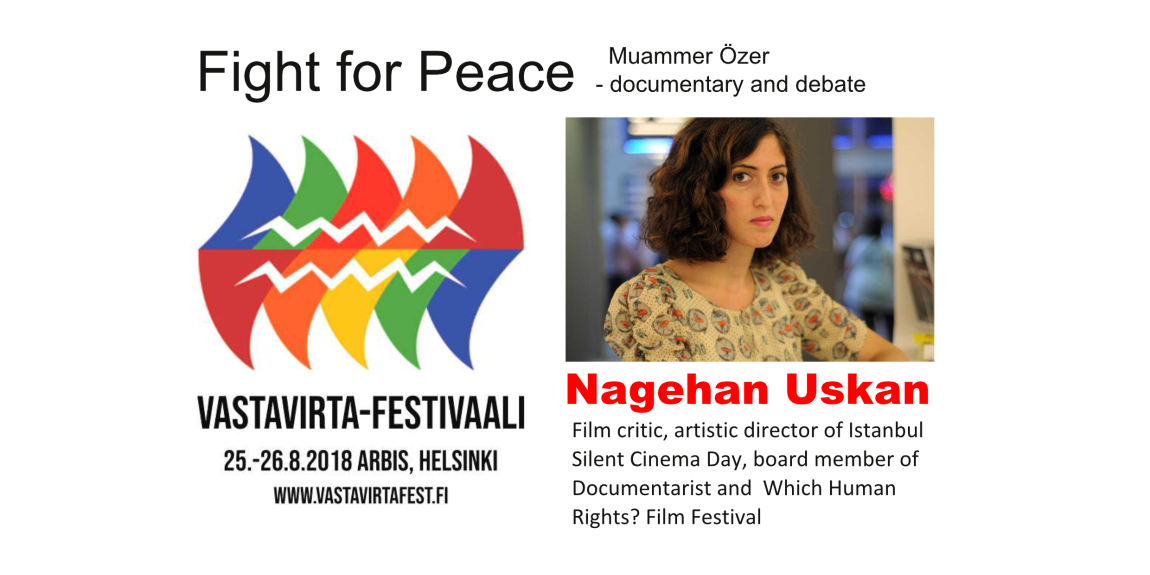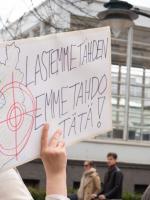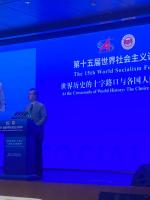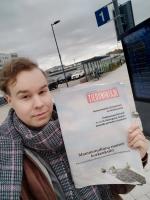Cinema of Solidarity at Vastavirta-festival
Turkish cinema researcher from Istambul Nagehan Uskan and Helsinki based editor of Rab Rab journal Sezgin Boynik will screen Turkish director Muammer Özer’s film "Fight for Peace"(Barış Kavgası) and open debate about cinema of solidarity and status of political film-making today in Vastavirta-festival.
The almost forgotten documentary produced in 1973 by Dev-Kino (Revolutionary Cinema) is a collage of fragments on the Finland civil war, worker’s struggles and contemporary mass strikes.
- Özer by using a very strong repertoire of archival footage juxtaposes Finnish protest songs and a poem by Nazım Hikmet. It is a tour de force of political cinema using historical references for commenting on contemporary situation. By showing this rare example of the internationalist cinema of solidarity of workers cause Sezgin and I want to open the debate about the status of political film-making today, says film critic, artistic director of "Istanbul Silent Cinema Day" Nagehan Uskan.
The screening will follow with Nagehan Uskan’s presentation on the Turkish militant documentary cinema examples from the seventies, and the sad history of their end with the coup d’état of 1980. Uskan in her presentation will draw lineage between militant cinema and the contemporary political documentary films in today’s Turkey by focusing on Kurdish documentary film works.
The presentation will follow with a discussion moderated by Sezgin Boynik, the editor of chief of Rab-Rab Journal, further questioning the forms of militant leftist films.
- I am very excited to screen a militant leftist film on the history of Finnish Class Struggles made by a director from Turkey. Especially I am proud to screen this film during the hundredth years commemoration of the Civil War, says Sezgin Boynik
Rab Rab Press – form and politics
Rab Rab Press´ aim is to shift the discussion toward the irreversibility of antagonisms; or towards the uneven relation between form and politics. It is at this intersecting field where we intend to look for contradictions. If Rab-Rab is deliberately about “form” and “politics”, it is important to have a few remarks on the relation between these two.
Rab Rab`s first theoretical position is that any work based on contradictions of formal properties of art production will lead to politics, and vice versa. Hence the involvement with political contradictions will disclose the heurism intelligible through forms. That’s why there is a correspondence between political formations and patterns of productions.
Rab Rab is not intending to stretch this relation any further, neither we are excited with explanations relying on theories of determinism.
- We don’t want to hide our satisfaction with the fact that works addressing political issues (such as brutality of fascist state, the issue of force of state apparatuses, the emancipatory potential of urban revolts, the indispensability of class struggles and other topics frequenting in the contributions of the journal) are both formally and conceptually richer than the ‘formal’ works accepting the banality of everyday capitalist ideologies as the sole fact of their work. What we want to make explicit is that the politics (read the politics of class struggles) enrich the form, but also that the formal contradictions of artistic productions are inseparable from the implications that rest in the extra-artistic field. To move one step further it is possible to claim that the class struggles in the art are elementary and ubiquitous forces which cannot be foreclosed in the mysticism of liberal experiences. Our position is that the novelties of artistic forms are born out of these coercions, explains Boynik
According to Rab Rab the relation between form and politics is a technical one; as the form can be a point of departure for heuristic activity in artistic productions, it is also a finite definition of reproduction. As such, the form is the name of every process that can be materialized in the effect of the repetition: from reproductions of the relations of production to the reproduction of patterns of representation.
- By claiming this, we are facing a theoretical closure that every attempt of formal inquiry is corresponding to the ideological operation which works “behind our backs” (Hegel). The observation that the ideological reiterations could be visible and detectable in the formal properties can make our position stronger.
Nevertheless, this detection will not happen by itself, it requires the direct confrontation with contradictions, undelines Boynik.
Vastavirta-festival in Helsinki
The Vastavirta (countercurrent) Festival is a collaborative concept of varied civil society organizations. The festival has been held roughly every second year for the last ten years. It is facilitated by the Democratic Civic Association (DSL), the European Left (EL), and the Communist Party of Finland (SKP)
Vastavirta Festival is an European open and political forum for radical activity, progressive collaboration and advocacy by those doing the doing.
The Vastavirta festival will take place from 25 to 26 August 2018 in Arbis, Dagmarinkatu 3, Helsinki.
Fight for Peace - debate in English about cinema of solidarity and status of political film-making today
Vastavirta-festival Sunday 26.8.2018 at 14.00-16.00 o'clock in the Auditorium
Nagehan Uskan is a documentary producer and film critic. After studying cinema at Bologna and Lyon Universities, she is now working on her PhD at the Sociology department of Mimar Sinan University in Istanbul, on the topic of Kurdish documentary cinema in Turkey. She is in the advisory board of Documentarist and Which Human Rights? Film Festival. She is the co-founder and artistic director of Istanbul Silent Cinema Days, which is organized in collaboration with Cineteca di Bologna in Italy. She also works as a film programmer for different institutions.
Sezgin Boynik, Rab Rab activist-journalist and theoretician based in Helsinki. He completed his PhD on Yugoslav “Black Wave” cinema. Co-edited Nationalism and Contemporary Art: Critical Reader (MM & Exit, 2007), and History of Punk and Underground in Turkey (BAS, 2008). He is editor-in-chief ofRab-Rab: journal for political and formal inquiries in art.




